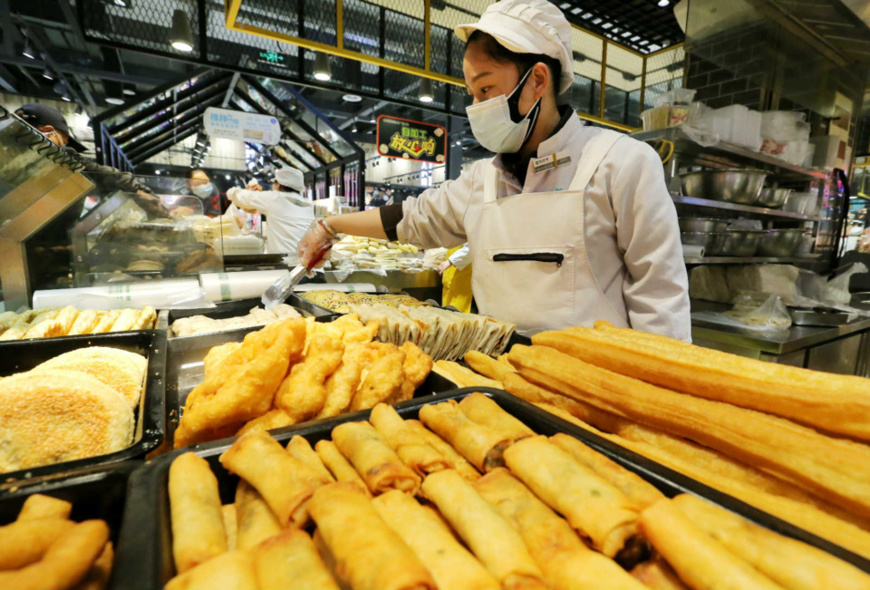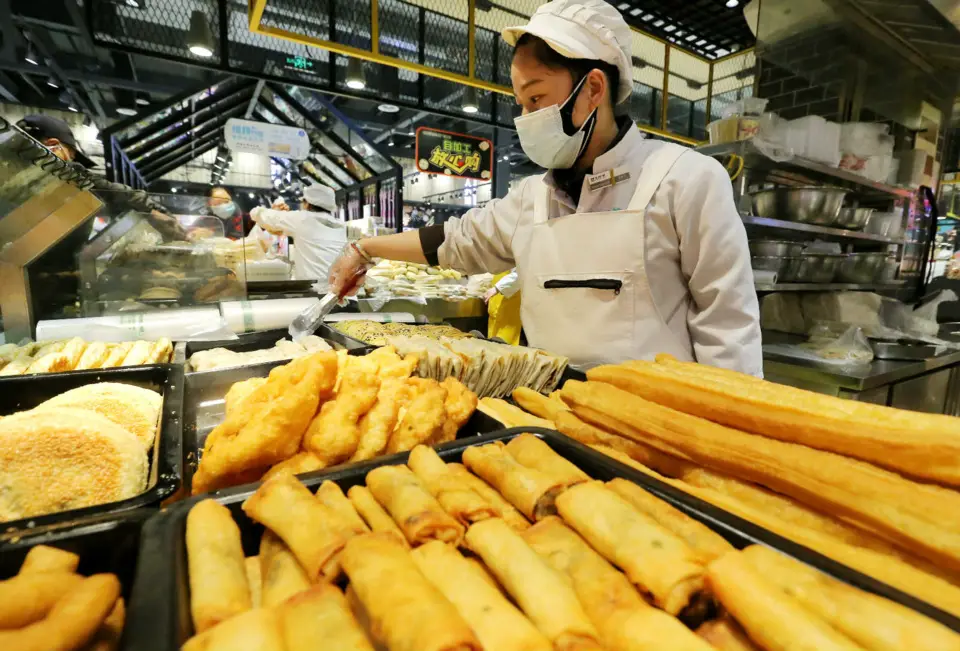By Lin Lili, People’s Daily

An employee of a supermarket makes pies for sale, Mar. 26. (Photo by Wang Jianmin/People's Daily Online)
China’s catering revenue registered 437.2 billion yuan (about $66.7 billion) in October, up 0.8 percent from the same period last year, marking the first year-on-year positive growth this year, according to data released by the National Bureau of Statistics (NBS) recently.
Catering industry is an important area in China’s efforts to stabilize economic growth and improve people’s livelihood as well as a barometer of economic recovery.
The fact that catering revenue growth rate shifted from negative to positive indicated that public confidence in domestic food and beverage consumption has been gradually restored, said Han Ming, director of China Hospitality Association.
Regular COVID-19 epidemic prevention and control measures have yielded obvious results, and the continuous policies rolled out by the central government and local governments to promote consumption have greatly driven consumption in catering industry, Han explained.
She added that the growth in catering revenue has also proven that while maintaining momentum for steady and long-term economic growth, China has also witnessed improvement in employment, increase in people’s incomes, and a gradual recovery in people’s spending power.
Due to the pandemic, the revenue of China’s catering sector dropped by 41 percent in the first four months of this year.
Since May, the revenue decline of the sector has continuously narrowed with the effective resumption of work and production, according to a report on the catering industry released by the China Cuisine Association (CCA).
Most catering enterprises have shaken off the adverse effects of the COVID-19 epidemic. In the first half of 2020, the operation activities of most catering companies in China had rebounded to 70 percent to 80 percent of their pre-epidemic levels, showing steady recovery.
Relevant government departments in China have issued policies and provided assistance for catering enterprises based on their actual needs during the outbreak, including tax and social insurance premiums reduction and exemption, noted Jia Feiyue, general manager of Beijing Huatian Catering Group, a leading catering company in Beijing.
“Our company has been making profits on the whole since March, and business in some time-honored restaurants under our company has returned to their pre-epidemic levels and seen a slight increase compared to last year,” Jia said.
“When the epidemic broke out at the beginning of the year, our company’s overall revenue plunged by more than 60 percent,” said Guo Jianping, general manager of a catering management company in Beijing.
The company has strictly followed relevant guidelines on epidemic prevention and control, according to Guo, who disclosed that the company has disinfected all its stores for multiple times every day and ensured fresh and quality food for customers.
These efforts have not only enabled the company to gradually bring business situation back to normal for existing stores, but open four new stores this year by Nov. 15, Guo said.
Government policies designed to promote consumption have continuously accelerated the recovery and growth of catering sector.
China’s Ministry of Commerce launched a month-long campaign that lasted from Sept. 9 to Oct. 8 to promote consumption and facilitate the recovery in spending.
Lately, 14 government departments including the National Development and Reform Commission have issued a work plan on expanding domestic demand and stimulating consumption.
“Our confidence in the long-term growth of the catering industry has remained unchanged,” said Han, who believes that food and beverage consumption will become greener, healthier and more safety-oriented in the future and that new forms and models of business will become the focus of innovation in the sector.
Catering industry that is bouncing back is merely a mirror of China’s economic recovery.
China’s industrial and service industries operated steadily and grew rapidly in October, when the value added of industrial enterprises above designated size rose by 6.9 percent year on year, basically the same as that achieved in September and 2.2 percentage points higher than the same period last year.
Meanwhile, China’s Index of Services Production grew by 7.4 percent year on year in October, 2 percentage points higher than the previous month.
In addition, the country’s investment and consumption have stabilized and rebounded; production factors have become more active; new drivers for development have continued to grow stronger; and economy has maintained steady recovery.
Multiple indicators have shown that the Chinese economy has seen growth in increasing facets and its growth momentum has been further consolidated.
With strong resilience, recovery capabilities and development potential, the Chinese economy has the foundation and conditions to achieve its goals for the entire year.
Catering industry is an important area in China’s efforts to stabilize economic growth and improve people’s livelihood as well as a barometer of economic recovery.
The fact that catering revenue growth rate shifted from negative to positive indicated that public confidence in domestic food and beverage consumption has been gradually restored, said Han Ming, director of China Hospitality Association.
Regular COVID-19 epidemic prevention and control measures have yielded obvious results, and the continuous policies rolled out by the central government and local governments to promote consumption have greatly driven consumption in catering industry, Han explained.
She added that the growth in catering revenue has also proven that while maintaining momentum for steady and long-term economic growth, China has also witnessed improvement in employment, increase in people’s incomes, and a gradual recovery in people’s spending power.
Due to the pandemic, the revenue of China’s catering sector dropped by 41 percent in the first four months of this year.
Since May, the revenue decline of the sector has continuously narrowed with the effective resumption of work and production, according to a report on the catering industry released by the China Cuisine Association (CCA).
Most catering enterprises have shaken off the adverse effects of the COVID-19 epidemic. In the first half of 2020, the operation activities of most catering companies in China had rebounded to 70 percent to 80 percent of their pre-epidemic levels, showing steady recovery.
Relevant government departments in China have issued policies and provided assistance for catering enterprises based on their actual needs during the outbreak, including tax and social insurance premiums reduction and exemption, noted Jia Feiyue, general manager of Beijing Huatian Catering Group, a leading catering company in Beijing.
“Our company has been making profits on the whole since March, and business in some time-honored restaurants under our company has returned to their pre-epidemic levels and seen a slight increase compared to last year,” Jia said.
“When the epidemic broke out at the beginning of the year, our company’s overall revenue plunged by more than 60 percent,” said Guo Jianping, general manager of a catering management company in Beijing.
The company has strictly followed relevant guidelines on epidemic prevention and control, according to Guo, who disclosed that the company has disinfected all its stores for multiple times every day and ensured fresh and quality food for customers.
These efforts have not only enabled the company to gradually bring business situation back to normal for existing stores, but open four new stores this year by Nov. 15, Guo said.
Government policies designed to promote consumption have continuously accelerated the recovery and growth of catering sector.
China’s Ministry of Commerce launched a month-long campaign that lasted from Sept. 9 to Oct. 8 to promote consumption and facilitate the recovery in spending.
Lately, 14 government departments including the National Development and Reform Commission have issued a work plan on expanding domestic demand and stimulating consumption.
“Our confidence in the long-term growth of the catering industry has remained unchanged,” said Han, who believes that food and beverage consumption will become greener, healthier and more safety-oriented in the future and that new forms and models of business will become the focus of innovation in the sector.
Catering industry that is bouncing back is merely a mirror of China’s economic recovery.
China’s industrial and service industries operated steadily and grew rapidly in October, when the value added of industrial enterprises above designated size rose by 6.9 percent year on year, basically the same as that achieved in September and 2.2 percentage points higher than the same period last year.
Meanwhile, China’s Index of Services Production grew by 7.4 percent year on year in October, 2 percentage points higher than the previous month.
In addition, the country’s investment and consumption have stabilized and rebounded; production factors have become more active; new drivers for development have continued to grow stronger; and economy has maintained steady recovery.
Multiple indicators have shown that the Chinese economy has seen growth in increasing facets and its growth momentum has been further consolidated.
With strong resilience, recovery capabilities and development potential, the Chinese economy has the foundation and conditions to achieve its goals for the entire year.
 Menu
Menu
 China’s catering revenue sees first positive growth of this year
China’s catering revenue sees first positive growth of this year
















